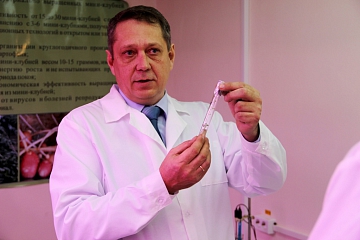Official opening of the laboratory for original virus-free seed potato growing
The unique scientific enterprise equipped with unique modular hydroponic installations for growing different plants has been opened on the premises of Altai Center for Applied Biotechnology.
“Altai State University has adopted a good tradition of establishing new laboratories on the Science Day. Last year we opened a few laboratories at the Faculty of Physics and Technology and the Faculty of Biology. This year we have established the laboratory for virus-free potato production,” noted ASU Rector Sergey V. Zemlyukov. “American silicon valley, as far as you know, has started from a number of sheds, where the high-technology science originated. As for ASU, here everything begins with semi-basements. Here the scientists start introducing scientific research results into practice. We would like to wish our biologists to help the university start the new stage of practice-oriented science aimed at accomplishing specific economic objectives of our region and our country, development of Russian food security.”


Sergey V. Zemlyukov has strengthened the traditions by cutting the green ribbon, the symbol of laboratory’s start of work, together with the head of Altai Krai Department of Economy and Investments Alexander A. Zhydkikh and director of Altai Center for Applied Biotechnology of ASU Dmitry A. Durnikin.
Dmitry A. Durnikin as a head of the laboratory has told the audience about “Potato Tree” hydroponic installation, where potato plants grow and tubers form. The laboratory produces mini-tubers weighing from 10 to 15 grams that grow to become full-fledged potato plants with the yield of 10–15 large tubers. Laboratory, which consists of 6 modules with 312 planting sites in each of them, gets three crops per year.
“Currently, almost all farming enterprises of Altai Krai purchase seed material outside the region: in Kemerovo Oblast and European part of Russia. Our objective is to change the situation, to make our farmers grow their own Altai seed potato. Moreover, we expect the farmers from neighbouring regions to buy our planting material,” said Dmitry A. Durnikin.
It remains to be added that the laboratory has already signed agreements with three farming enterprises of Altai Krai and one wholesale company for virus-free seed potato purchase. Now ASU scientists are planning to increase laboratory’s productivity.

